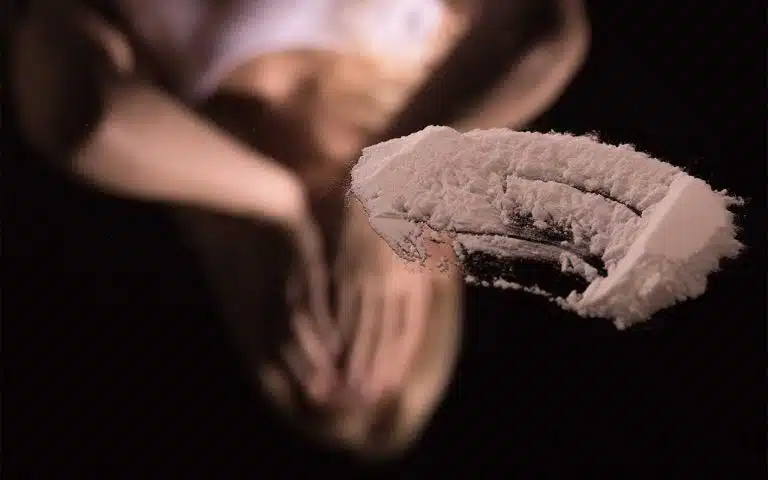Schizophrenia & Cocaine Use
- Dual Diagnosis
- Symptoms Of Schizophrenia
- Symptoms Of Cocaine Use
- Cocaine-Induced Psychosis
- Dual Diagnosis Treatment

Cocaine is widely abused in various forms. It is potent, euphoric, and powerfully addictive.
In recent decades, cocaine use has also become strongly associated with the mental health disorder schizophrenia for a number of reasons.
Cocaine Use Disorder & Schizophrenia
There is a misconception that cocaine use is a cause of schizophrenia. However, this is not true.
While the cause of schizophrenia is not fully understood, health care experts understand it to be something you are either born with the potential to develop, or not.
This potential, which may involve issues with the neurotransmitters dopamine and glutamate, is then triggered by specific environmental factors, including:
- pregnancy and birth complications
- childhood trauma
- changing environments
- social isolation
- urban settings
- substance abuse
While cocaine use does not cause schizophrenia, it can contribute to its development among those born with particular genetic predispositions.
Self-Medication
In addition, there is a high prevalence of comorbid substance abuse among those with mental disorders.
Many seek out substances like alcohol, opioids, or cocaine in an attempt to self-medicate, using drugs to help cope with the discomfort, confusion, and distress that schizophrenia and other serious mental illnesses can cause.
Symptoms Of Schizophrenia
Symptoms of schizophrenia typically start in the early to mid-20s for men, and in the late 20s for women. These include both positive and negative symptoms.
Positive Symptoms
Positive symptoms are those that involve changes in behavior or thinking, including:
- delusions, or coming to believe things that are not based in reality
- hallucinations, or hearing/seeing things that are not real
- disorganized thinking and speech, or being unable to properly communicate
- disorganized or abnormal movements and postures
Negative Symptoms
Negative symptoms are those associated with a reduction in activity or participation in daily life. These symptoms may include:
- reduced motivation to work, study, or meet other responsibilities
- lack of outward emotion
- no eye contact
- inability to feel pleasure
- lack of self-care or personal hygiene
- irritability and depression
Symptoms Of Cocaine Use Disorder
Cocaine use can cause a number of symptoms which are strikingly similar to schizophrenia. While an individual is high, symptoms of cocaine use may include:
- elevated mood and energy level
- sensitivity to sight, touch, or sound
- restlessness
- paranoia
- dilated pupils
- increased body temperature, blood pressure, and heart rate
- loss of appetite
- reduced inhibition
- unpredictable movement
After the high wears off, the effects of cocaine comedowns or crashes often include:
- exhaustion
- depression
- anxiety
- difficulty sleeping or excessive sleep
- neglect of self-care, including dehydration, malnourishment, and poor hygiene
- withdrawal and secrecy
- mood swings
- paranoia
- lack of initiative, motivation, or interest in normal activities
- psychosis
Cocaine-Induced Psychosis
Psychotic symptoms are some of the most severe side effects associated with cocaine substance use disorder.
Stimulant drug use, including cocaine, methamphetamine, and amphetamine, greatly increases dopamine activity for a short period in the brain, resulting in a euphoric high.
But because cocaine provides such a short-lived rush, it is sometimes used repeatedly and binged for days at a time. As this use continues, however, the body downregulates dopamine receptors until cocaine loses its effect, leaving individuals with a severe dopamine deficiency.
This deficiency can then trigger psychosis, with individuals crashing into a psychotic episode with symptoms that may include:
- paranoia
- anxiety
- delusions
- anger
- hallucinations
- delirium
- suicidal or homicidal impulses
- disorganized thinking
Cocaine-Induced Psychosis & Schizophrenia
Unfortunately, those with a psychiatric disorder like schizophrenia may encounter activation of stimulant psychosis at much lower doses than would cause psychosis in members of the general population.
And with continued drug abuse, they may become increasingly sensitized to stimulant drugs and have an increased risk of hospitalization and serious harm as a result.
Dual Diagnosis Treatment Options
While cocaine addiction may not cause schizophrenia, it can impact the treatment of schizophrenic patients.
Those with schizophrenia and an addiction to cocaine may be less likely to seek treatment, which likely requires an integrated and comprehensive dual diagnosis treatment program to address schizophrenic symptoms and addiction.
Inpatient Treatment For Both Conditions
Clinicians can best provide dual diagnosis care in an inpatient setting, where both the drug addiction and mental illness can be addressed simultaneously.
Schizophrenia is likely first treated with antipsychotic medications. Treatment providers attempt to find the best combination of drugs to manage symptoms at the lowest possible dose. Further treatments involve varied forms of therapy, social skills training, and vocational rehabilitation.
Substance abuse treatment for cocaine addiction begins with medical detox, followed by motivational or behavioral therapy like contingency management.
If you or a loved one struggles with addiction and one or more comorbidities, including schizophrenia, professional treatment can help. To learn more, please contact us today.
Written by Ark Behavioral Health Editorial Team
©2024 Ark National Holdings, LLC. | All Rights Reserved.
This page does not provide medical advice.
Dialogues in Clinical Neuroscience - Substance abuse in patients with schizophrenia (nih.gov)
Mayo Clinic - Schizophrenia Symptoms and causes
Molecular Psychiatry - Neurobiological basis of relapse prediction in stimulant induced psychosis and schizophrenia: the role of sensitization
National Institute on Drug Abuse (NIDA) - How is cocaine addiction treated?
Questions About Treatment?
Ark Behavioral Health offers 100% confidential substance abuse assessment and treatment placement tailored to your individual needs. Achieve long-term recovery.
100% confidential. We respect your privacy.
Prefer Texting?
Our friendly support team is here to chat 24/7. Opt out any time.







 Learn More
Learn More








